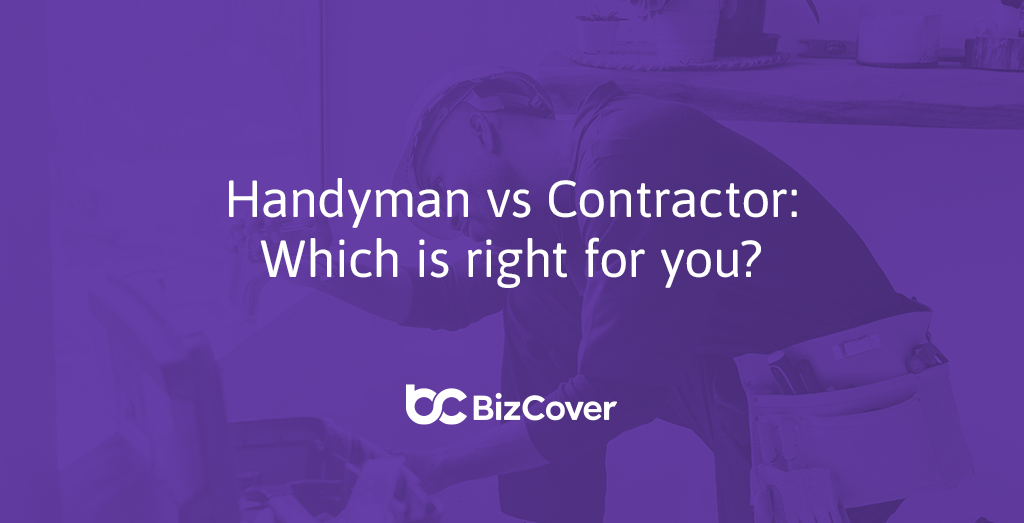Handyman vs contractor: Which is right for you?
While they have a lot of common ground, there are a number of pivotal differences between a handyman and a licensed contractor and the work they can legally provide to homeowners and clients.
As such, if you are a handyman running your own handyman small business anywhere in Australia, it’s important that you understand the difference between being a handyman and being a contractor.
This is a critical point to grasp, because in practice handymen may very well have the skills and experience required to perform the same jobs that a contractor does. In fact, a contractor and a handyman may even have a very similar set of skills, but the key catch here is licencing and certification.
In Australia there is no formal handyman licence that an individual is required to hold to provide the general handyman scope of work to clients. However, contractors are required to be licensed to do what they do. As such, contractors typically complete an apprenticeship in their trade and hold a certified trade licence to practice their trade, be it plumbing, electrical work, carpentry, or any other trade on offer in Australia.
Defining a licensed contractor
To operate as a licensed contractor in Australia an individual needs to either be registered or licensed by an independent government body. The contractor will be required to maintain their trade certifications by meeting a pre-determined number of requirements.
A contractor usually works on large and complicated projects that can take many weeks or months to complete, sometimes with a small team supporting them on site. A contractor holds a specific and specialised licence, such as a plumbing licence, a carpentry licence, or an electrical licence, which requires a certain amount of education and experience.
Together, these requirements demonstrate that the budding contractor has taken and passed all the necessary exams and is now qualified to perform the contractor job at hand. A licensed contractor is still required to be tested for competency in their trade before they will be allowed to accept paid work.
Defining a handyman
In contrast to the formal qualifications and apprenticeships required for contractors and tradies, when it comes to formal qualifications for operating a handyman small business and providing handyman services, there really isn’t much to cover. This is because there are no official regulations that handymen must meet before offering their services to clients.
A handyman typically works on home improvement projects that only require one person. A standard job for a handyman may take anywhere from a mere few hours to a couple of days to complete.
It’s worth noting here that this doesn’t actually mean that a handyman is less skilled than a trade-qualified contractor. It just means that they can’t legally provide certain services that a licensed contractor can provide.
Different approaches to pricing
Another common difference between a handyman and a contractor in Australia is how they each typically price their services and how they each itemise their invoices and charge their clients.
A handyman is more likely to charge either by the day or by the hour, and as a result will generally be cheaper than a licensed contractor. This makes sense given the scope of work that a handyman is legally allowed to do versus the larger suite of services that a licensed contractor is legally allowed to provide.
How handymen can reduce their risk with business insurance
Given the nature of the job, many handymen choose to reduce their risk through insurance for handyman services, just as licensed contractors choose to reduce their risk through contractor insurance. The importance of handyman insurance is clear when you consider that many handymen operate as sole traders, meaning they are personally responsible, both legally and financially, for their business.
To help reduce the risks to your handyman small business, you may consider the following three types of business insurance that can help reduce the risks to your business.
Public Liability Insurance: Cover for legal fees and compensation costs if a customer, member of the public or a supplier claims against you for injury or damage to their property as a result of your alleged negligent business activities.
Business Insurance: An insurance package designed to provide cover for your business contents, stock, tools and commercial premises when an insured event occurs (such as fire, storm, theft or even accidental damage). A Business Insurance package can also cover portable equipment, glass, and for loss of revenue due to business interruption in specified circumstances.
Personal Accident and Illness insurance provides different levels of cover for loss of income, permanent disablement and even death if you are unable to work as a result of an injury or illness (even if it occurs outside your work).
Give BizCover a call today on 1300 920 864 for a quote and get your handyman insurance* sorted in minutes and get on with your day. We don’t believe in filling in reams of paperwork or using confusing insurance jargon, just drama free insurance in the click of a button. Purchase your handyman insurance online now.
This information is general only and does not take into account your objectives, financial situation or needs. It should not be relied upon as advice. As with any insurance, cover will be subject to the terms, conditions and exclusions contained in the policy wording.
© 2022 BizCover Pty Limited, all rights reserved. ABN 68 127 707 975; AFSL 501769
ABN 68 127 707 975; AFSL 501769
This information is general only and does not take into account your objectives, financial situation or needs. It should not be relied upon as advice. As with any insurance, cover will be subject to the terms, conditions and exclusions contained in the policy wording. © 2025 BizCover Limited.





